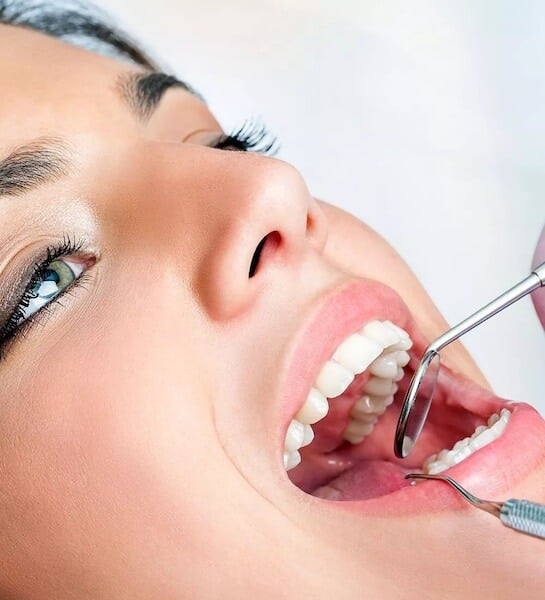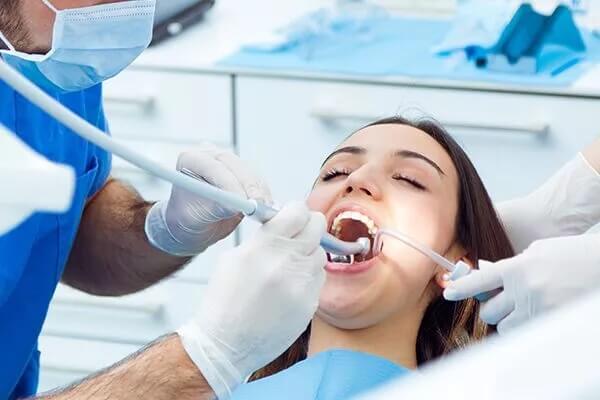Understanding Tooth Extraction

Tooth extraction, commonly called tooth pulling, is used as a last-resort treatment in most circumstances. Common reasons for the extraction of a permanent (adult) tooth include:
- Wisdom teeth crowding – It’s completely normal to have one or more wisdom teeth growing in at painful, dangerous angles. If even one tooth is a risk for erupting in a way that causes other teeth to come out of alignment or pain to the patient, then extraction of all wisdom teeth is typically recommended.
- Severe tooth decay – Rarely, a tooth is so decayed or rotted that it cannot be saved with fillings, root canal therapy, and other preventive treatments. In these circumstances, tooth extraction is recommended to prevent decay from spreading to other teeth and gum disease growth. To prevent tooth decay, always get your semi-annual cleanings and dental checkups.
- Intense pain – While uncommon, there are instances when a patient’s level of pain can cause them to opt for extraction. Pain usually stems from some form of infection, air, or fluid touching an exposed nerve in the tooth.
- Infection – Deeply rooted infection, in the tooth or surrounding gum, can make tooth extraction an important dental decision for the overall health of the patient. These instances are exceedingly uncommon, and can usually be handled with antibiotics and preventive treatments.
Extraction Risks
Tooth extraction is a surprisingly major surgery, as permanent teeth are made to last an individual’s entire life; the roots of these teeth are anchored in bone and must be carefully removed to avoid dangerous complications and intense pain. If not performed by an experienced dental surgeon, the patient could be at risk for some undesirable side effects with their tooth extraction including the dreaded painful “dry socket,” infection, and other health complications. Patients should be advised of the risks before undergoing extraction, and we always advise choosing alternative treatments to save the tooth whenever possible. Contact us today to set up an extraction consultation.
Implant Options

Once a tooth has been extracted, patients often feel self-conscious or inconvenienced by the missing area of the tooth. What many people don’t realize right away is that an extracted tooth leaves a deeper gap than just the visible tooth, causing the gums to curve upwards to where the core of the tooth once was. Many seek a dental implant or bridge to fill the void left behind by the missing tooth, both of which we can provide at Salvatore Dental. We employ the latest dental implant technology, so you won’t even notice the difference between your old tooth and your new one!
Our Extractions
Salvatore Dental performs tooth extractions on wisdom teeth, baby teeth, and teeth that cannot be otherwise saved. Dr. Richard Jr. completed a residency program that focused on tooth extractions and has developed advanced techniques to make the appointment as comfortable as possible. We also offer laughing gas (nitrous oxide) to help our patients with reduced anxiety.
Preparing for a Tooth Extraction
Preparing for a tooth extraction is an important step to ensure a smooth and successful procedure. Prior to your appointment, it is crucial to:
- Communicate any medical conditions, medications, or allergies to your dental team
- Follow any pre-extraction instructions provided by your dentist, which may include fasting requirements if sedation will be used
- Arrange transportation to and from the dental office if sedation is involved
If you have any concerns or questions, don't hesitate to reach out to your dental office for clarification. By adequately preparing for your tooth extraction, you can help create a safe and comfortable environment for the procedure, setting the stage for a speedy recovery and optimal oral health.
Aftercare and Recovery
Proper aftercare and recovery following a tooth extraction are vital for ensuring optimal healing and minimizing discomfort. After the extraction, your dental team will provide specific instructions tailored to your situation.
It's important to follow these guidelines, which may include:
- Gently biting down on a gauze pad to control bleeding
- Avoiding vigorous rinsing or spitting
- Refraining from using a straw or smoking to prevent dislodging the blood clot that forms in the extraction site.
Managing swelling and discomfort can be aided by applying an ice pack to the affected area and taking prescribed or over-the-counter pain medications as directed. Maintaining good oral hygiene by gently brushing the remaining teeth and avoiding the extraction site will promote healing.
Consuming soft foods and gradually reintroducing a normal diet can aid in the recovery process. If any unusual symptoms or concerns arise, promptly contact our dental office for guidance. By adhering to the aftercare instructions and giving yourself time to heal, you can ensure a successful recovery and pave the way for optimal oral health.
What is a dental extraction?
A dental extraction is a procedure where a tooth that cannot be saved is removed. This could be due to damage or infection, or it could be a baby tooth or a wisdom tooth that needs to be removed. The extraction process involves numbing the patient and removing the tooth.
Why might I need a tooth extraction?
There are several reasons why a tooth extraction may be necessary. These include a tooth being broken from trauma, an infection that cannot be treated by other means, a wisdom tooth that doesn't have enough room to grow, or a baby tooth that hasn't fallen out naturally.
Are there different types of tooth extractions?
Yes, there are different types of tooth extractions. These range from simple extractions, which are straightforward procedures, to surgical extractions, which involve more complex surgery. There are also cases where teeth are impacted, meaning they are stuck under the bone or behind another tooth, which requires further surgery.
When would a dentist recommend a wisdom tooth extraction?
A dentist would recommend a wisdom tooth extraction if there isn't enough room in the patient's mouth for the wisdom teeth, which can cause crowding and damage to other teeth. Wisdom teeth may also be removed if they have decay or other issues, as they can be difficult to clean due to their position in the back of the mouth.
When would braces require tooth extraction?
Braces may require tooth extraction if there isn't enough room in the mouth for all the teeth. If the teeth are crowded, an orthodontist might decide to remove a few teeth to ensure the remaining teeth can be positioned correctly.
Can tooth extractions be advisable for young patients?
Yes, tooth extractions can be advisable for young patients. This could be due to a baby tooth that hasn't fallen out naturally, causing problems for the adult tooth, or a large cavity that can't be fixed.
When would a tooth extraction be necessary with gum disease?
Tooth extraction may be necessary with severe gum disease, where both the gum and the bone around the tooth have been affected. If the bone has receded to the point where the tooth is loose, it may be advised to remove the tooth.
Are all tooth extractions considered oral surgery?
Yes, all tooth extractions fall under the category of oral surgery.
What's the difference between a simple and a surgical extraction or simple removal versus a surgical removal?
The difference between a simple and a surgical extraction is based on the complexity of the procedure. A simple extraction involves the removal of a loose tooth with minimal effort, while a surgical extraction involves the removal of a tooth that is broken, fractured, or requires additional procedures such as sectioning the tooth or removing bone around the tooth.
Where should I go if I need an emergency tooth extraction?
Salvatore Dental offers emergency tooth extractions and has an emergency line available.
How long does a tooth extraction take?
The length of a tooth extraction can vary. A simple extraction or a baby tooth extraction may take as little as 30 seconds after numbing, while a more complicated extraction may take up to an hour.
Will I need a dental implant after tooth extraction?
Whether a dental implant is needed after tooth extraction depends on which tooth is removed. Implants are generally recommended for any essential chewing tooth, both in the front and the back.
Will I be asleep for my tooth extraction?
Depending on the complexity of the extraction and the patient's comfort, various levels of sedation can be used. These range from IV sedation administered by an anesthesiologist, to a lighter conscious sedation with a pill and laughing gas, to local anesthesia with just numbing.
How do I take care of my teeth or brush my teeth after a tooth has been extracted?
After a tooth extraction, it's important to be gentle in the area of extraction. Avoid brushing in that area and any vigorous rinsing on the day of the extraction. As the area starts to heal over the next few days, you can start to clean it gently, but never be too aggressive.
What should I do for aftercare following a tooth extraction?
After tooth extraction, it's recommended to ice the area to reduce swelling, rest and keep the blood pressure low, elevate your head while sleeping, and take any prescribed pain control and antibiotics. Avoid rinsing or spitting, eat soft foods, and follow all post-op instructions.
Should I avoid rinsing after tooth extraction?
Yes, rinsing after tooth extraction should be avoided as it could dislodge the blood clot that forms in the socket, leading to a painful condition known as a dry socket.
How long should I wait to exercise after tooth extraction?
Depending on the complexity of the extraction, it's recommended to wait one to four days before doing any vigorous workout. Light activities like walking are fine.
How long does it take to recover from a tooth extraction?
The recovery time from a tooth extraction depends on several factors including the difficulty of the extraction, the number of teeth removed, the patient's age, and their overall health. Some patients may feel fine the next day while others may take a few more days.
When should I schedule an appointment for tooth extraction?
It's recommended to schedule an appointment for tooth extraction as soon as it's diagnosed that the tooth needs to be removed. Waiting until the tooth hurts or is infected can make numbing and extraction more difficult. Please don't hesitate to call Salvatore Dental at (518) 868-6900 if you have any questions or need to schedule an extraction.
Schedule Your Appointment
Ready to take the next step towards a healthy and confident smile? Schedule your appointment with our experienced dental team in Saratoga Springs today. Our friendly staff is dedicated to providing exceptional care and ensuring your comfort throughout your visit. Whether you're in need of an extraction or any other dental treatment, we offer convenient scheduling options to accommodate your busy lifestyle.
